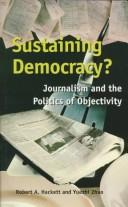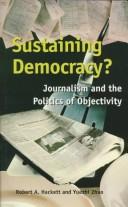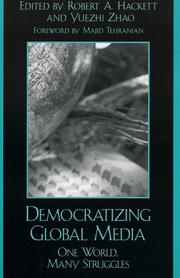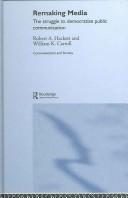| Listing 1 - 10 of 12 | << page >> |
Sort by
|

ISBN: 9781551930138 Year: 2010 Publisher: Toronto University of Toronto Press
Abstract | Keywords | Export | Availability | Bookmark
 Loading...
Loading...Choose an application
- Reference Manager
- EndNote
- RefWorks (Direct export to RefWorks)
Journalism --- #KVHA:Media --- #KVHA:Journalistiek --- #KVHA:Objectiviteit --- #KVHA:Pers en politiek --- Press and politics --- Bias in journalism --- Slanted news --- Journalistic ethics --- Objectivity --- Press and propaganda --- Political aspects

ISBN: 1551930137 9781551930138 Year: 1997 Publisher: Chicago (Ill.) : Garamond press,
Abstract | Keywords | Export | Availability | Bookmark
 Loading...
Loading...Choose an application
- Reference Manager
- EndNote
- RefWorks (Direct export to RefWorks)
Journalism --- Press and politics --- Bias in journalism --- Slanted news --- Journalistic ethics --- Objectivity --- Press and propaganda --- Political aspects --- Objectivity. --- Political aspects.
Book
ISBN: 1442602996 Year: 2019 Publisher: Toronto : University of Toronto Press,
Abstract | Keywords | Export | Availability | Bookmark
 Loading...
Loading...Choose an application
- Reference Manager
- EndNote
- RefWorks (Direct export to RefWorks)
The news media are often accused of lacking objectivity. Sustaining Democracy? asks whether it is worth trying to be objective in the first place by addressing current, and highly topical, debates on the relationship between journalism and democracy in Canada and the United States. These debates are made all the more urgent by the perceived crises of technological change, declining and fragmented audiences, media concentration, and popular cynicism about public life.
Journalism --- Objectivity. --- Political aspects.
Book
Abstract | Keywords | Export | Availability | Bookmark
 Loading...
Loading...Choose an application
- Reference Manager
- EndNote
- RefWorks (Direct export to RefWorks)

ISBN: 0742536432 0742536424 Year: 2005 Volume: *5 Publisher: Lanham (Md.) : Rowman and Littlefield,
Abstract | Keywords | Export | Availability | Bookmark
 Loading...
Loading...Choose an application
- Reference Manager
- EndNote
- RefWorks (Direct export to RefWorks)
Communicatie [Politieke ] --- Communicatie in de politiek --- Communication en politique --- Communication in politics --- Democracy --- Democratie --- Democratisering --- Democratization --- Démocratie --- Démocratisation --- Démocratisation (Science politique) --- Inspraak in het beleid --- Overlegcultuur --- Political communication --- Politieke communicatie --- Self-government --- Transition démocratique --- Transition vers la démocratie --- Communication in politics. --- Democracy. --- Democratization. --- Mass media --- Political aspects. --- Political science --- Equality --- Representative government and representation --- Republics --- Democratic consolidation --- Democratic transition --- New democracies --- Political aspects --- Mass media Political aspects

ISBN: 1551930277 Year: 1999 Publisher: Ottawa : Canadian Centre for policy alternatives,
Abstract | Keywords | Export | Availability | Bookmark
 Loading...
Loading...Choose an application
- Reference Manager
- EndNote
- RefWorks (Direct export to RefWorks)
Censorship --- Freedom of the press --- Reporters and reporting

ISBN: 0415394686 0415394694 Year: 2006 Publisher: New York Routledge
Abstract | Keywords | Export | Availability | Bookmark
 Loading...
Loading...Choose an application
- Reference Manager
- EndNote
- RefWorks (Direct export to RefWorks)
This is a co-authored book of all new material on the topic of media democracy and activism. The authors consider the ways in which media, particularly broadcast media is made by and for a narrow audience of white, middle-class, heterosexual, Westerners that conform to the ideal values of the governing body. They consider how certain demographics are denied representation in the news, how they are unable to afford new technologies (digitalization, the internet, broadband) and cannot afford the education in order to get employment in the media industries and thus gain equality in choosing content. The authors call this the democratic deficit of mainstream media and look at alternate forms of activism to redress the imbalance in the media. They consider ways in which new media like the internet could be used to allow multiple perspectives of the same event, rather than only one side of the story being broadcast, and then consider how this still negates the reason for the activism as the internet is not available to all. The text considers the key concepts of political media theory. The main cast are all here: Gramsci, Bourdieu, Habermas, Baudrillard etc as well as the new activism groups - CPBF, Media Alliance, FAIR. Freedom of speech and the importance of freedom of the media is more at debate now than ever before with the issuance of special journalism visas for British journalists to enter the USA and the whole BBC sexing up Iraq debacle, so the book will be quite topical if the authors deliver on time.
Communication --- Democracy. --- Democratization. --- Mass media --- Political aspects. --- Democracy --- Democratization --- Communication in politics --- Democratic consolidation --- Democratic transition --- Political science --- New democracies --- Self-government --- Equality --- Representative government and representation --- Republics --- Communication and politics --- Politics and communication --- Political aspects --- Mass media Political aspects
Book
ISBN: 9781138950399 9781138950382 1138950394 9781315668734 9781317361985 1138950386 1317362004 1317361997 1315668734 Year: 2017 Publisher: London Routledge, Taylor & Francis Group
Abstract | Keywords | Export | Availability | Bookmark
 Loading...
Loading...Choose an application
- Reference Manager
- EndNote
- RefWorks (Direct export to RefWorks)
This volume recognises that climate change is more than an environmental crisis. It is also a question of political and communicative capacity. This book enquires into which approaches to journalism, as a particularly important form of public communication, can best enable humanity to productively address climate crisis. The book combines selective overviews of previous research, normative enquiry (what should journalism be doing?), and original empirical case studies of environmental communication and media coverage in Australia and Canada. Bringing together perspectives from the fields of environmental communication and journalism studies, the authors argue for forms of journalism that can encourage public engagement and mobilization to challenge the powerful interests vested in a high-carbon economy--'facilitative' and 'radical' roles particularly well-suited to alternative media and alternative journalism. Ultimately, the book argues for a fundamental rethinking of relationships between journalism, publics, democracy and climate crisis.
Climatic changes --- #KVHA:Klimaatopwarming --- Mass media and the environment --- #KVHA:Journalistiek --- Environment and mass media --- Changes, Climatic --- Changes in climate --- Climate change --- Climate change science --- Climate changes --- Climate variations --- Climatic change --- Climatic fluctuations --- Climatic variations --- Global climate changes --- Global climatic changes --- Climatology --- Climate change mitigation --- Teleconnections (Climatology) --- Press coverage --- Environmental aspects --- Journalism --- Environmental protection. Environmental technology --- Global environmental change
Book
ISBN: 1743320450 174332801X 1920899707 Year: 2018 Publisher: University of Sydney
Abstract | Keywords | Export | Availability | Bookmark
 Loading...
Loading...Choose an application
- Reference Manager
- EndNote
- RefWorks (Direct export to RefWorks)
Expanding Peace Journalism: Comparative and Critical Approaches draws together cutting-edge contributions from 17 international writers to this rapidly emerging field of research. Media coverage of conflicts is propagandistic and commonly portrays two elite actors contesting a single goal of 'victory'. This major new text explores and interrogates peace journalism as a significant challenge to this hegemonic discourse, which has been advocated and elaborated over the recent years in journalism, media development and academic spheres.Expanding Peace Journalism traces boundaries and links with the adjacent fields including alternative media, social movement activism and media democratisation. It includes case studies - from the media of countries including Australia, Canada, Guatemala, India, Nigeria, Norway, Sweden and the US - and explores connections with human rights, as well as Indigenous and women's rights activism.
Book
ISBN: 9781920899707 Year: 2011 Publisher: Sydney Sydney University Press
Abstract | Keywords | Export | Availability | Bookmark
 Loading...
Loading...Choose an application
- Reference Manager
- EndNote
- RefWorks (Direct export to RefWorks)
| Listing 1 - 10 of 12 | << page >> |
Sort by
|

 Search
Search Feedback
Feedback About UniCat
About UniCat  Help
Help News
News